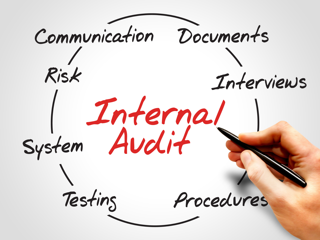If you run a business, it must have internal controls – it’s that simple. Without it, you could run a chaotic or possibly fraudulent business, which isn’t a risk any business owner wants to take.
It may feel like yet another stressor to put on yourself as a business owner, but with the right controls in place, you’ll ensure a business that thrives, is safe and provides your clients with what they want.
What are Internal Controls?

Internal controls are like checkpoints or audits. They provide assurance that your business meets its objectives, prevents fraud, and has accountability measures for all employees. No two companies will have the same internal controls as each business has different operations and needs.
No matter which internal controls you set, there are five framework components they follow:
- Process – How you handle the internal controls
- Assessing risks – Identifying risks so you know what controls you need
- Identifying controls – Naming what could control the risks
- Communication – How you will share the information internally and externally
- Following up – Measuring the success of your internal controls
Do all Businesses Need Internal Controls?
No matter the size or industry of your business, every business benefits from internal controls. From management to operations and financial controls, every business needs a system that covers every aspect of running the business including bookkeeping.
If you aren’t sure what your business needs, take a step back and assess your current internal controls. What does your business do right? What does it do wrong? What would you like to see done better?
The answers to these questions will help you create the right internal controls for your business.
The Top 8 Reasons your Business Needs Internal Controls
If you think your business doesn’t need internal controls, here are 8 reasons to consider it.
1. Everyone is on the same page
Company guidelines keep everyone on the same page. Employees and management will know what’s expected of them, the consequences when a rule is violated, and how they’re expected to conduct themselves.
Any changes a company must make are communicated immediately and may even be documented to ensure everyone acknowledges the changes and understands them.
2. Account reconciliation
One small mistake in financial documents could offset your entire company budget. Creating internal controls that oversee your bookkeeping and financial documents could ensure all accounts balance and everyone is on the same page.
Whether you hire professional bookkeepers or have employees do the reconciliation, it’s an important part of every business’s framework.
3. Can increase performance
With the right tools in place, management can continually check on the company’s progress and make changes as needed. When you maximize your processes and ensure everything is done to the highest degree, it also helps your company’s bottom line.
With proper numbers in place, management can make the right decisions regarding a company’s future.
4. It reduces the risk of loss
There’s always a risk of fraudulent activity or honest mistakes, both of which can hurt your company’s bottom line. With the right internal controls in place, you can reduce the risk of such activities and offset any losses.
Whether you’re talking about consistently reconciling accounts or running internal audits, the continuous eyes on the numbers will catch anything fishy or off and put an end to any risks immediately.
5. Creates review systems
Think of it like a checks and balances system. Every employee has roles, but who is overseeing those roles? If certain tasks go unmonitored, it’s easier to make mistakes or let criminal or fraudulent activity slip through the cracks.
The right internal controls set up a system so everyone’s tasks have a second set of eyes on them.
6. Outlines each employee’s duties
It can be easy for tasks to ‘cross lines’ when they aren’t properly outlined. This can lead to confusion, tasks not getting done, or too many people trying to do the same task. This can cause more chaos than is necessary. With the right internal controls in place, though, you can outline what each employee does, who is responsible, and hold anyone accountable that isn’t doing their job.
7. They ensure timely financial statements
If you’re like most business owners, financial duties can take a back burner to operational duties, but they shouldn’t. When you don’t properly file your financial documents it can confuse things, cause you to go over budget, and make tax time a nightmare.
With the right controls in place, you’ll know when and how to create the financial statements, what’s required of them, and to get the necessary help if it’s not something you can complete on time.
8. You’ll meet company objectives faster
With the right internal controls in place, everyone will know their duties and all aspects of your business will run how you planned. This makes it much easier to meet your company objectives or adjust as needed when things aren’t quite going as planned.
Final Thoughts
Internal controls keep your business running efficiently. From management to operations to bookkeeping, every aspect of your business needs controls or a second set of eyes to oversee your processes, ensure they are efficient, and that all processes are properly run
You can set up your own internal controls, but always revisit them and see what’s working and not working for your business. There’s no shame in changing the way things are done or outsourcing certain tasks, such as bookkeeping or any other tasks. Get the help you need to keep your business thriving, operating efficiently, and within compliance.
You may be interested in: AI in HR: Importance of Artificial Intelligence Technology in HR
